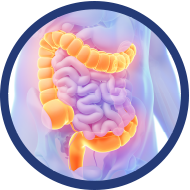Balanced intestinal flora
The intestinal flora is made up of different species of beneficial bacteria, that colonise intestinal mucosa, living in symbiosis with the organism.
The intestinal flora contains beneficial, "friendly" bacteria and also harmful, “bad” bacteria. In a healthy organism the proportion of “good” bacteria should be 85% against 15% of “bad” bacteria”1.

The role of probiotics in the organism2
The intestinal flora performs many functions and have a beneficial effect on the body, including:


- It can stimulate the immune system
- It can reduce the occurrence of antibiotic-induced diarrhea
- It can shorten the duration and severity of infectious diarrhea
- It can reduce the pain and flatulence caused from Irritable Bowel Syndrome
During the lifetime, our intestinal flora changes depending on many factors. Stress, lifestyle, diet, hygiene, but especially all treatments with antibiotics can affect the intestinal flora on the long term.
When fighting infections, antibiotics destroy bad bacteria getting the victory, but as a result of the victorious fight of the antibiotics, good bacteria are also affected, and our intestinal flora is unbalanced.
A single oral treatment with antibiotics destroys the composition and diversity of intestinal flora for months and even up to one year in many cases. The intestinal flora imbalance involves symptoms such as bloating, abdominal discomfort, growling stomach and even diarrhea.3


When is it advisable to take probiotics?


 Following treatment with oral antibiotics
Following treatment with oral antibiotics
Use of antibiotics is common in children. Studies have shown that almost 20% of the children in treatment with antibiotics have developed diarrhea. The American Academy of Paediatrics recommends the use of probiotics for the prevention of antibiotic-associated diarrhea.4
In adults, the incidence of antibiotic-associated diarrhea is reported in 5 to 25% of patients.5
This rate has increased in recent years, even with an incidence of 30% reported in some cases.6
A solution for restoring the intestinal flora affected by antibiotics and reducing the occurrence of diarrhea associated with antibiotic treatment, would be to associate a probiotic in order to balance the created imbalance.
 Following food poisoning - in infections of the intestinal tract
Following food poisoning - in infections of the intestinal tract
Probiotics are recommended to restore the balance of intestinal flora in the case of food poisoning, infectious diarrhea, as treatment associated with the main treatment.
 In the treatment of Irritable Bowel Syndrome
In the treatment of Irritable Bowel Syndrome
Probiotics are also recommended in case of abdominal discomfort in patients with Irritable Bowel Syndrome, intestinal functional disorders, intestinal dyspepsia, with symptoms such as:


- Diarrhea
- Bloating
- Constipation alternating with diarrhea
- Abdominal discomfort
- Growling stomach
- In association with the background treatment - main treatment.
1. Holzapfel WH, Haberer P et al.” Overview of gut flora and probiotics”.Int J of Food Microbiol 1998; 41:85-101
2. American Family Physician, 2008, 78(9), 1073-78
4. Clin Gastroenterol Hepatol 2012 September
5. World J Gastroenterol 2014 December 21; 20(47)
6. J.Winstron, S.Ragner, frequency of antibiotic- associated diarrhea in 2462 antibiotic treated patients, Journal of Antimicrobial Chemotherapy 2001.

